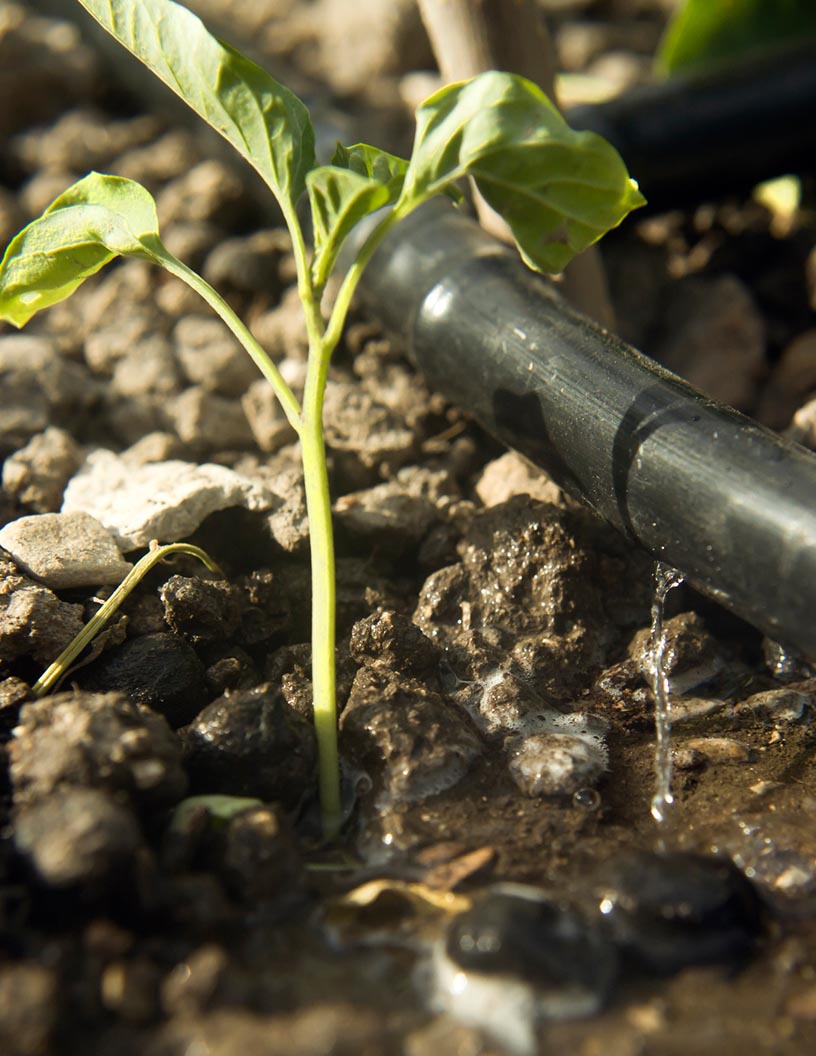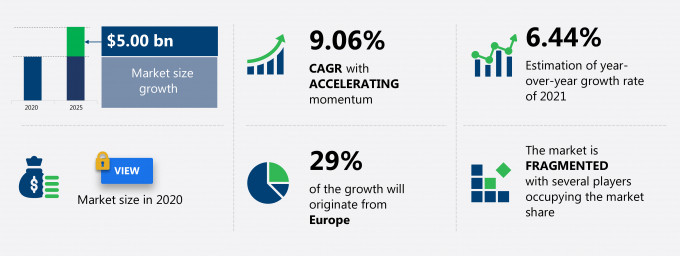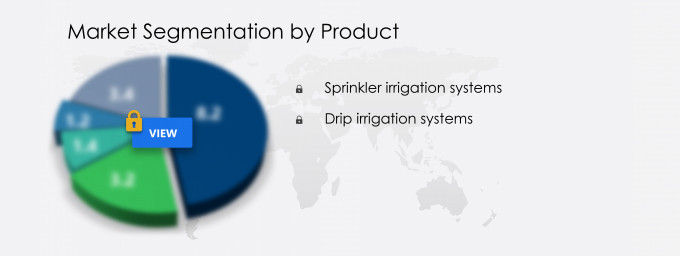The micro irrigation systems market share is expected to increase by USD 5.00 billion from 2020 to 2025, and the market’s growth momentum will accelerate at a CAGR of 9.06%.
This micro irrigation systems market research report provides valuable insights on the post COVID-19 impact on the market, which will help companies evaluate their business approaches. Furthermore, this report extensively covers micro irrigation systems market segmentation by product (sprinkler irrigation systems and drip irrigation systems), application (orchard crops, field crops, plantation crops, and forage and grasses), and geography (North America, APAC, Europe, South America, and MEA). The micro irrigation systems market report also offers information on several market vendors, including Hunter Industries Inc, Irritec SpA, Jain Irrigation Systems Ltd., Lindsay Corp., Mahindra and Mahindra Ltd., Nelson Irrigation Corp., Orbia Advance Corp. SAB de CV, Rain Bird Corp., The Toro Co., and Valmont Industries Inc. among others.
What will the Micro Irrigation Systems Market Size be During the Forecast Period?
Download the Free Report Sample to Unlock the Micro Irrigation Systems Market Size for the Forecast Period and Other Important Statistics
Micro Irrigation Systems Market: Key Drivers, Trends, and Challenges
The growing focus on efficient use of natural resources is notably driving the micro irrigation systems market growth, although factors such as the need to frequently replace components of micro irrigation systems may impede market growth. Our research analysts have studied the historical data and deduced the key market drivers and the COVID-19 pandemic impact on the micro irrigation systems industry. The holistic analysis of the drivers will help in deducing end goals and refining marketing strategies to gain a competitive edge.
Key Micro Irrigation Systems Market Driver
Water is an essential requirement for agriculture. Most of the water used for irrigation comes from natural resources. The agriculture sector in some of the regions, including Europe, is affected by drought and water scarcity. End-users are increasingly using water-efficient irrigation systems such as micro irrigation systems. Micro irrigation systems ensure the proper application of water to the soil for germination. They help optimize the air and water balance in the soil to maintain better soil conditions for root development. Micro irrigation systems can also reduce water loss during irrigation and help cover more areas of the field with less water. The control heads in micro irrigation systems ensure the delivery of water at the desired discharge rate. Hence, the water-saving benefits offered by micro irrigation systems help end-users conserve water and ensure the efficient use of natural resources.
Key Micro Irrigation Systems Market Trend
The continuous supply of electricity is an important requirement for the working of micro irrigation systems. In rural areas, especially in developing and emerging countries, access to the electricity grid may not always be guaranteed. In such cases, an independent and alternative energy system can be a solution for farmers to secure a safe power source for micro irrigation systems. A solar-powered micro irrigation systems (equipped with a solar cell) combines the efficiency of micro irrigation with the reliability of a solar-powered water pump. The popularity of solar-powered irrigation systems has encouraged some vendors to offer such models in the global market. Some of the government agencies are also focusing on installing solar-powered micro irrigation systems. Therefore, the growing popularity of solar-powered micro irrigation systems may increase the sales of such units and, thereby, positively influence the growth momentum of the market during the forecast period.
Key Micro Irrigation Systems Market Challenge
Winds can hamper the functioning of nozzles in micro irrigation systems, particularly sprinkler irrigation systems and affect water distribution in fields. Drippers and tapes in drip irrigation systems are easily damaged by insects and rodents, and the removal and installation of parts require additional labor. In automatic sprinklers and emitters used in micro irrigation systems, the replacement of components requires reprogramming of the entire irrigation system. Some of the components, such as drip lines, can get damaged during high-pressure variations. Sprinklers and drippers work well at the right operating pressure recommended by the manufacturer. So, high water pressure can damage the components, which may require replacement for proper functioning. So, the frequent replacement of micro irrigation components may increase the overall maintenance cost of micro irrigation systems for farmers.
This micro irrigation systems market analysis report also provides detailed information on other upcoming trends and challenges that will have a far-reaching effect on the market growth. The actionable insights on the trends and challenges will help companies evaluate and develop growth strategies for 2021-2025.
Parent Market Analysis
The growth in the global agricultural and farm machinery market will be driven by factors such as the increasing number of product launches, increasing vendors' focus on production capacity expansions, and government support for buying agricultural and farm machinery. Our research report has extensively covered external factors influencing the parent market growth potential in the coming years, which will determine the levels of growth of the micro irrigation systems market during the forecast period.
Who are the Major Micro Irrigation Systems Market Vendors?
The report analyzes the market’s competitive landscape and offers information on several market vendors, including:
- Hunter Industries Inc
- Irritec SpA
- Jain Irrigation Systems Ltd.
- Lindsay Corp.
- Mahindra and Mahindra Ltd.
- Nelson Irrigation Corp.
- Orbia Advance Corp. SAB de CV
- Rain Bird Corp.
- The Toro Co.
- Valmont Industries Inc.
This statistical study of the micro irrigation systems market encompasses successful business strategies deployed by the key vendors. The micro irrigation systems market is fragmented and the vendors are launching advanced models of drip irrigation systems, strengthening geographical presence by opening new branches, acquisitions, and entering into agreements with government agencies or end-users to compete in the market.
Product Insights and News
- Hunter Industries Inc - The company offers a micro irrigation system that provides users the most value, including better control and water savings.
To make the most of the opportunities and recover from post COVID-19 impact, market vendors should focus more on the growth prospects in the fast-growing segments, while maintaining their positions in the slow-growing segments.
The micro irrigation systems market forecast report offers in-depth insights into key vendor profiles. The profiles include information on the production, sustainability, and prospects of the leading companies.
Micro Irrigation Systems Market Value Chain Analysis
Our report provides extensive information on the value chain analysis for the micro irrigation systems market, which vendors can leverage to gain a competitive advantage during the forecast period. The end-to-end understanding of the value chains is essential in profit margin optimization and evaluation of business strategies. The data available in our value chain analysis segment can help vendors drive costs and enhance customer services during the forecast period.
The value chain of the agricultural and farm machinery market includes the following core components:
- Inbound logistics
- Operations
- Distribution and logistics
- Marketing and sales
- After-sales services
- Innovations
The report has further elucidated on other innovative approaches being followed by manufacturers to ensure a sustainable market presence.
Which are the Key Regions for Micro Irrigation Systems Market?
For more insights on the market share of various regions Request for a FREE sample now!
29% of the market’s growth will originate from Europe during the forecast period. Germany and the UK are the key markets for micro irrigation systems in Europe. Market growth in Europe will be faster than the growth of the market in other regions.
A rise in investment in landscaping such as public gardens, parks, and commercial green areas will facilitate the micro irrigation systems market growth in Europe over the forecast period. This market research report entails detailed information on the competitive intelligence, marketing gaps, and regional opportunities in store for vendors, which will assist in creating efficient business plans.
COVID Impact and Recovery Analysis
The outbreak of the COVID-19 pandemic in 2020 reduced the sales of micro irrigation systems in the region due to a decline in agriculture activities owing to lockdown restrictions to control the spread of the disease. The micro irrigation systems manufacturing industry was temporarily shut down primarily during the first half of 2020, which declined the demand for micro irrigation systems. However, the economy of the region is expected to recover from the pandemic crisis due to the availability of COVID-19 vaccines. The ongoing vaccination drives to an extent contained the spread of the disease and resulted in the full resumption of production operations in 2021. Such factors are expected to drive the growth of the regional micro irrigation systems market during the forecast period.
What are the Revenue-generating Product Segments in the Micro Irrigation Systems Market?
To gain further insights on the market contribution of various segments Request for a FREE sample
The micro irrigation systems market share growth by the sprinkler irrigation systems segment will be significant during the forecast period. Sprinkler irrigation systems cover small and large areas of land and are suitable for all soil types and plants arranged on slopes. These systems are more efficient than drip irrigation systems in delivering water to elevated areas. The increasing preference for new models of sprinkler irrigation systems can accelerate the growth of the market during the forecast period.
This report provides an accurate prediction of the contribution of all the segments to the growth of the micro irrigation systems market size and actionable market insights on post COVID-19 impact on each segment.
|
Micro Irrigation Systems Market Scope |
|
|
Report Coverage |
Details |
|
Page number |
120 |
|
Base year |
2020 |
|
Forecast period |
2021-2025 |
|
Growth momentum & CAGR |
Accelerate at a CAGR of 9.06% |
|
Market growth 2021-2025 |
$ 5.00 billion |
|
Market structure |
Fragmented |
|
YoY growth (%) |
6.44 |
|
Regional analysis |
North America, APAC, Europe, South America, and MEA |
|
Performing market contribution |
Europe at 29% |
|
Key consumer countries |
US, China, Germany, Canada, and UK |
|
Competitive landscape |
Leading companies, Competitive strategies, Consumer engagement scope |
|
Key companies profiled |
Antelco Pty Ltd., Chinadrip Irrigation Equipment Co. Ltd., Dubois Agrinovation Inc., Elgo Irrigation Ltd., Fujian Dafengshou Irrigation Technology Co.Ltd. , Hunter Industries Inc, Irritec SpA, Jain Irrigation Systems Ltd., Lindsay Corp., Mahindra and Mahindra Ltd., Metro Irrigation, Microjet Irrigation Systems, Nelson Irrigation Corp., Orbia Advance Corp. SAB de CV, Rain Bird Corp., Raindrip Inc., Rivulis Irrigation Ltd., The Toro Co., T L Irrigation Co., and Valmont Industries Inc. |
|
Market dynamics |
Parent market analysis, Market growth inducers and obstacles, Fast-growing and slow-growing segment analysis, COVID-19 impact and recovery analysis and future consumer dynamics, Market condition analysis for the forecast period |
|
Customization purview |
If our report has not included the data that you are looking for, you can reach out to our analysts and get segments customized. |
What are the Key Data Covered in this Micro Irrigation Systems Market Report?
- CAGR of the market during the forecast period 2021-2025
- Detailed information on factors that will drive micro irrigation systems market growth during the next five years
- Precise estimation of the micro irrigation systems market size and its contribution to the parent market
- Accurate predictions on upcoming trends and changes in consumer behavior
- The growth of the micro irrigation systems industry across North America, APAC, Europe, South America, and MEA
- A thorough analysis of the market’s competitive landscape and detailed information on vendors
- Comprehensive details of factors that will challenge the growth of micro irrigation systems market vendors
We can help! Our analysts can customize this report to meet your requirements. Get in touch



